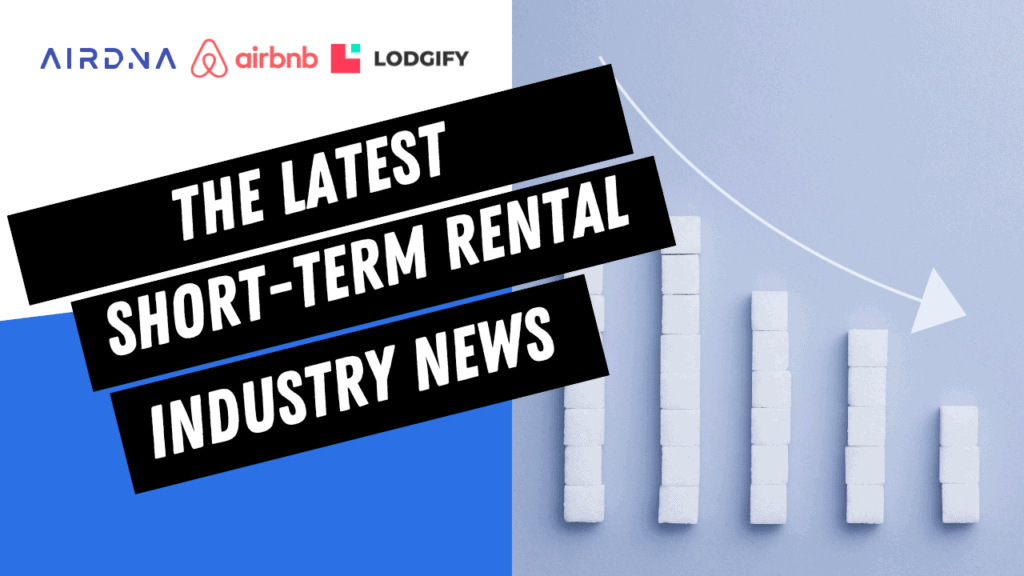The Cold Reality: AirDNA’s January Review Reveals U.S. Market Slowdown
Key Takeaways for Vacation Rental Managers:
- The AirDNA U.S. Market Review reports a decrease in short-term rental (STR) demand, primarily due to an Arctic air mass affecting much of the U.S. This weather phenomenon, particularly impacting mountain resorts in California and the West, led to reduced snowpack and less interest from snow enthusiasts.
- A severe season of flu, COVID, and RSV, with a peak around New Year’s Day and occurring five weeks later than the previous season, has discouraged travel. This contributed significantly to the decreased demand for STRs.
- There was 1.3% year-over-year growth in demand nights for January, with occupancy levels not reaching the higher pre-pandemic levels seen in the last quarter of 2023.
- January experienced a drop in available STR listings, with nearly 73,000 fewer listings than December 2023. This reduction affected all location types but was especially pronounced in mountain and lake resorts.
The unusually large drop in listings may be attributed to seasonal trends, exacerbated by the cold weather and higher interest rates, along with a decrease in new listings since May 2022 due to post-Covid STR performance challenges. - The STR market saw its first negative year-over-year change in new bookings (-2.7%) in 21 months during January, indicating a slowdown in demand growth.
- Removing New York from U.S. data changes the year-over-year growth rate from 1.3% to 2.1%, highlighting New York’s significant impact on overall figures.
- While mountain resorts and urban locations saw negative year-over-year changes, warmer regions and areas outside New York’s influence, such as Jersey City/Newark and San Antonio, experienced increases in demand.
- Despite the downturn in demand, Average Daily Rates (ADR) improved in January compared to December, with urban locations and mid-size cities seeing the highest growth rates. New York’s ADR grew significantly at 37.5%, mainly due to regulatory changes leading to the exit of lower-priced properties.
- The Repeat Rent Index (RRI): The RRI tracks the revenue performance of the same properties over time. An improvement in New York’s RRI (+2.6%) suggests genuine growth in existing property revenues, beyond just the addition of more expensive listings.
About AirDNA:
- AirDNA aggregates data from over 10 million Airbnb and Vrbo listings across 120,000 global markets, providing an analytical foundation for understanding short-term rental performance. Key tools offered by AirDNA are:
- Airbnb Calculator: Evaluates a property’s investment potential by analyzing revenue possibilities and occupancy rates.
- Market Research: Offers insights into evolving short-term rental industry trends to inform strategic decisions.
- Smart Pricing: Delivers dynamic pricing recommendations based on real-time market demand to optimize listing profitability.
Uvika’s View:
- Adverse weather conditions and ongoing health concerns have notably impacted STR demand, underscoring the importance of flexibility and adaptability in your business model.
- Consider expanding your portfolio to include properties in regions less affected by seasonal changes or health-related travel hesitations.
- Make your properties more appealing by focusing on cozy indoor amenities or implementing health and safety measures.
- The significant drop in STR listings presents a double-edged sword. On one hand, reduced competition can lead to increased visibility for your properties. On the other hand, it signals the need to stay informed about local regulations, market demand, and interest rates to enable you to navigate these changes more effectively.
- The negative year-over-year change in new bookings indicates a need for STR hosts to reassess their marketing strategies and guest engagement efforts. Focusing on creating unique guest experiences, leveraging social media and digital marketing, and targeting specific traveler segments can help boost demand for your properties.
- Despite the downturn in demand, the growth in Average Daily Rates (ADR) offers an opportunity to increase revenue. Optimizing your pricing strategy based on market trends, property uniqueness, and guest preferences can help you capitalize on this ADR growth.
Airbnb Announces 2024 Preferred Software Partners
Key Takeaways for Vacation Rental Managers:
- A new cohort of property and channel management software partners has been designated as “Preferred” or “Preferred+” by Airbnb. This initiative aims to improve operations and guest experiences for professional hosts.
- The Preferred Software Partners program is designed to recognize and reward top-performing software partners that provide high-quality solutions to Airbnb’s professional host community. It offers a trusted repository of partners for business-related tasks.
- Included in the program are benefits like fast-tracked and dedicated technical support, the opportunity to provide feedback on API features, and other advantages to maximize their status.
- To achieve “Preferred” or “Preferred+” status, partners must meet strict integration, technical, foundational, and performance requirements, including undergoing a data security and API quality review.
- The announcement includes 34 partners with either “Preferred” or “Preferred+” status, such as Airhost, Beds24, Uplisting, Hostaway, and Lodgify among others.
- This program provides a curated list of dependable software partners to help optimize listing management, transaction viewing, special offers, and guest feedback understanding, thereby enhancing operational efficiency and guest satisfaction.
- Partners with “Preferred” status meet Airbnb’s requirements, while those with “Preferred+” exceed them, indicating a higher level of integration with Airbnb’s platform.
About Airbnb:
- Airbnb is a platform for listing, discovering, and booking accommodations worldwide.
- Hosts utilize Airbnb to rent out various properties, including homes, apartments, and unique lodging like igloos and treehouses.
- Guests can search for accommodations by location, price, and amenities, and book directly through the platform.
Uvika’s View:
- Airbnb’s Preferred Software Partners program is not unique; competitors like Booking.com and Vrbo have similar initiatives.
- The significance of these programs runs much deeper than mere badges of honor for the chosen software providers, offering tangible benefits that can transform the day-to-day management of short-term rentals.
- These programs are meticulously designed to highlight software partners that exemplify quality, reliability, and seamless integration with the OTA platforms. For short-term rental managers, this translates into a curated list of tech solution providers that stand out not just for their functionality but for their commitment to elevating the rental experience.
- Choosing a Preferred or Preferred+ software partner comes with a suite of advantages that can confer a competitive edge:
- Reliable Connections: Preferred partners often boast more stable and reliable connections to OTA platforms, reducing the risk of double bookings and other operational headaches.
- Access to Cutting-edge Features: Being aligned with a recognized software provider may grant you early access to innovative features and tools, enabling you to stay ahead in a competitive market.
- Influence on Platform Evolution: Working closely with a preferred partner offers a unique opportunity to provide feedback on upcoming features, potentially influencing the development of booking platforms in ways that better serve your business needs.
- Priority Technical Support: Recognized partners typically receive fast-tracked technical support from OTAs, ensuring any issues are swiftly addressed, thus minimizing disruptions to your operations.
- That said, while the allure of recognition programs is undeniable, short-term rental managers should approach the selection process with a discerning eye and evaluate each software provider’s compatibility with their specific business model and operational needs. The right partner should not only offer a robust connection to your chosen OTA but also align with your goals for growth, scalability, and guest satisfaction.
Related read: How to pick a short-term rental software vendor
Lodgify Launches Dynamic Pricing Feature to Simplifying Revenue Management for Its Users
Key Takeaways for Vacation Rental Managers:
- Vacation rental management software provider Lodgify has announced the launch of its Dynamic Pricing feature, aimed at automating rate optimization.
- The tool is designed to help hosts and property managers using Lodgify maximize bookings and revenue by automatically adjusting nightly rates based on real-time market data, removing the need for continuous manual price monitoring.
- Utilizing an algorithm that assesses over 40 listing attributes (such as location, amenities, guest capacity), demand, and seasonality, Lodgify Dynamic Pricing predicts and adjusts rates in line with market trends, reportedly increasing revenue by an average of 20%.
- This feature is integrated directly into the Lodgify platform, allowing users to activate Lodgify Dynamic Pricing and manage pricing strategies alongside other aspects of their rental business within the same system.
- It also offers eighteen months of predictive nightly rates instantly.
About Lodgify:
- A comprehensive vacation rental platform established in Barcelona, Spain in 2012, Lodgify assists independent hosts and property managers in starting and expanding their businesses by offering tools for website creation, direct bookings, payments, and synchronization of property data across major OTA channels, thereby centralizing property management tasks.
Uvika’s View:
- Across all levels of the industry, we’re witnessing a trend towards aggregation and simplification, as businesses seek to provide comprehensive solutions under one roof. Lodgify’s initiative to incorporate dynamic pricing into its suite of offerings is a testament to this broader industry evolution.
- From a strategic standpoint, the value proposition of Lodgify’s Dynamic Pricing tool is clear. For hosts and property managers striving for efficiency and simplicity, the allure of managing all operational aspects—including pricing—through a single platform is compelling.
- However, the tool is not without costs; it incurs a fee of 0.8% for each confirmed reservation obtained while the feature is activated. This fee structure necessitates a careful evaluation of the tool’s benefits against its costs to ensure that the adoption contributes positively to hosts’ bottom line.
- Dynamic pricing software typically relies on scraping data from major booking platforms like Airbnb, Booking.com, and Vrbo. Lodgify’s access to its users’ data enhances the accuracy of its recommendations, but it could be helpful for users to know more about the break up of origin data to assess how closely the tool’s suggestions align with their unique market conditions and property characteristics.







